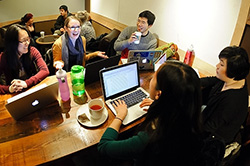Fourth Year: Connecting the Dots

Senior year is a time for a lot of excitement and reflection.
Students should feel proud of the journey they’ve taken — from filling out college applications in high school to approaching graduation and a career. It’s been a long road, but these are the years they’ll remember, both for the struggles and for the triumphs.
As they think of what’s behind them, senior year is also a time for students to think about what comes after graduation: getting a resume ready, looking for a job, networking, and fine-tuning skills that will aid in the employment search.
Seniors often worry about finding a job as they watch some classmates find jobs quickly while others struggle to find employment in their chosen fields. And they worry about ending up back at home. These worries add to other pressures of senior year.
This is a good time to remind your student of all that he or she has accomplished and to help keep your student on track. Reassure your student that there are numerous good options and more than one path to success — whether it’s immediately going to work, attending graduate school, or doing service work in the Peace Corps.
It’s important for your student to have a plan, but even more important to be able to adjust when things don’t go according to that plan.
Remind your student about the resources on campus. He or she can seek assistance with a resume at the Cross-College Advising Service or the Writing Center, and ask classmates and faculty for suggestions about the job-seeking process, including how best to showcase skills and knowledge in a resume. Talking with others can be the best way for students to discover what they already know. When creating a resume, it can help to think beyond what a student did and think about what a student learned.
Looking for and applying for jobs or graduate schools can seem like a full-time job itself. But students aren’t in it alone; numerous campus resources can help with developing resumes and cover letters, as well as practicing interview skills. Career counselors know what skills employers are looking for in today’s market, and they can help students articulate those skills in their resumes.
It’s completely natural for both students and parents to feel a bit unprepared for what comes after senior year, but by helping students think about how their experiences connect, they’ll be excited to think about what comes next. Focus on what has been accomplished, encourage your student to feel proud of making it this far, and begin looking forward to the future.
